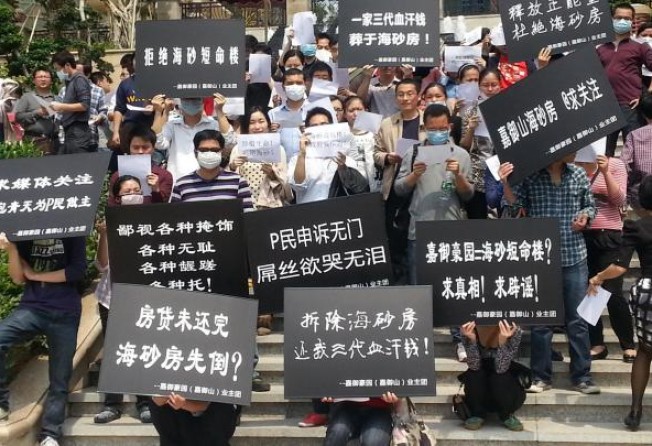Flat owners reject official test results on suspected substandard concrete
Flat owners in Shenzhen stage a fourth protest over claims that substandard concrete was used in the construction of Jiayu Garden

Hundreds of flat owners of Shenzhen's Jiayu Garden staged a fourth protest yesterday in Longgang district over suspicion that developers had used cheap sea sand in the concrete, despite a government statement assuring the flats they bought were safe.
The Shenzhen Housing and Construction Bureau released a statement on its official website yesterday saying six major property projects in the city, including Jiayu Garden and Ping An International Financial Centre, which at 660 metres will be the city's tallest building when completed, were safe and met national standards for concrete.
The sites were among 14 major projects across the city put on hold last week while local government officials tested concrete samples for traces of untreated sea sand after a national television exposé triggered concerns over building safety.
The bureau said in its statement that it would release the test results of the remaining eight projects over the coming week.
The government said its tests were based on the code for durability design of concrete structures, which the ministry of housing and urban-rural development introduced in 2008.
It said the Ping An samples contained 0.064 per cent chloride ions while Jiayu Garden's samples were 0.099 per cent, which the Shenzhen government said were within the code's limit of 0.3 per cent. But the announcement did not appease the protesters. Flat owners at Jiayu Garden collected concrete samples yesterday at the same place where they were taken by the bureau and sent them to Hong Kong for a third-party analysis.
The South China Morning Post was invited to witness and follow the test.
"We won't believe the results from mainland authorities and developers," property owner Steve Wang said.
"The government's statement cannot be evidence to prove the property developers did not replace expensive river sand with much cheaper sea sand as their building material. We want them to provide documentary proof of the sand they used."
According to another concrete standard introduced last year, sand used in reinforced concrete and pre-stressed concrete must contain less than 0.06 and 0.02 per cent chloride ions respectively. Sea sand must be processed for use in reinforced concrete, and is banned in pre-stressed concrete.
The latest building safety scandal follows a China Central Television news programme on March 14 that reported on the rampant use of untreated sea sand by Shenzhen developers.
Sea sand contains high levels of salt and chloride that can corrode steel reinforcement bars, weakening buildings and even cause them to collapse. Fifteen concrete-mixing plants have had their licences revoked.